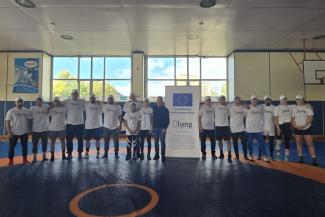Legendary Coach Pedro Val Bragueira of Cuba, Dies at 65
Thursday, August 9, 2018 - 16:05 By United World Wrestling Press

HAVANA, Cuba (July 31) – Cuba’s longtime head Greco-Roman wrestling coach Pedro Val Bragueiradied last Friday after a long illness. He was 65.
Pedro Val was the head of the Greco-Roman national team between 1975 and 2015 and was the personal coach to many of Cuba’s wrestling legends, including three-time Olympic champion Mijaín LOPEZ, two-time Olympic champion Filiberto AZCUY, and 1992 Olympic champion Héctor MILIÁN.
In 2010 Pedro Val was distinguished as the best coach in the world by United World Wrestling.

“He was like a father on the mat and outside of the mat,” said López. “It won’t feel the same going to train every day knowing that he is no longer with us.”
Pedro Val started studying to become a wrestling Instructor in 1966, after being admitted to the Escuela Superior de Educación Física Comandante Manuel Fajardo. After two years later -- and at a very young age -- he took up his first coaching position in the town of Colimar.
In 1975, on the basis of his results, he received the title of Profesor de Educación Física y Deporte, awarded by the ESEF Cmdt. Manuel Fajardo. He would later progressed to a Licenciado and Master degrees.

Pedro Val’s coaching career at the national level started in 1971, when he was appointed as head of the Greco-Roman national Junior team. He held this position until 1974, obtaining great results at the international level, and in 1975 he was promoted to head of the Senior team.
During his 40-year tenure on the mat he excelled in his job, laying the technical and organizational groundwork to establish the excellence of Cuban Greco-Roman wrestling at the continental and world levels and leaving an inestimable heritage that transcends national boundaries.
Pedro Val will be deeply missed by the wrestling community across the world.


Share your thoughts.
Comments